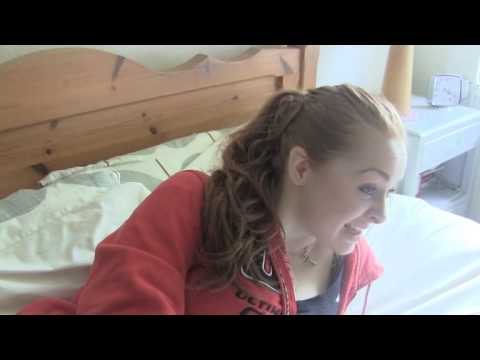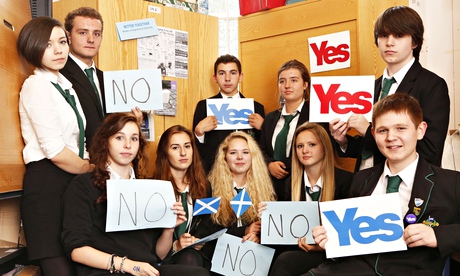Lucy Wallace, 16, will be voting no. “It’s gut feeling, I feel British as well as Scottish. I haven’t really discussed it at home because my mum doesn’t want to talk about politics. But we’ve had a lot of debates in school, we’ve gone to meetings and heard speakers. I feel I understand now why people are voting yes. I think they have some good points.”
Joe Higgins, 18 and sporting a yes badge, has made a YouTube video at school with two classmates – one backing the no campaign and one undecided – to explore the issues.
“The debates we have had have been very civil, they’ve been good fun. This school has been pretty good about giving people the information and the space to talk about it. I think it can be a problem if you can only talk about it with family and friends … in a family situation you may only hear one side. We have been encouraged to express our own opinions.”
These young voters have participated in a two-year programme at the school, led by head of modern studies Eva Georgeson. They have had a mock referendum, meetings outside school, and the older pupils looked at the arguments around key issues such as currency and Scotland’s membership of international organisations. Pupils have been allowed to wear yes and no badges, while Georgeson and colleagues have remained carefully neutral. “It is a question of the students learning how to think about something that is controversial,” she says. “I have not influenced them in any way, I have helped them to explore the issues. This is a big decision for their first vote but I would say they are up for it. They are keen to vote, they see it as an important decision that will affect them.”
Meanwhile, at Springburn academy in north-east Glasgow the focus has been on getting young people registered and encouraging them to vote rather than directly discussing the key issues. Jayne Ashley, head of modern studies, says: “We found that about 40% of our young people thought they might not be registered to vote. We have made them aware of the process and helped them.
“I feel very passionately about political literacy and political education. I talk to them about why they should vote. We have not taught directly about the referendum because it’s politically very sensitive.”
Springburn is barred from holding debates on the referendum as Glasgow, like many of Scotland’s 32 councils, is applying a strict interpretation of the “purdah” rules that govern what public bodies can do or say in the runup to an election.
This stance has caused concern among some educationalists. Susan Quinn – a teacher, union activist and yes campaigner – said the debating bans were disappointing. “This is an educational opportunity that could be missed. The young people want to engage in this important decision for their future.”
Some young people in Fife have started an online petition calling for free discussion of the referendum in schools.
Jan Eichhorn, fellow in social policy at Edinburgh University, who has been studying the voting intentions of under-18s and carried out two surveys of teenage voting intentions, says some schools and councils may have taken an over-cautious approach. His work shows that class discussion has a positive effect on engagement and voting confidence.
“Young people who have discussed the referendum in class are more likely to say they feel knowledgeable about the referendum, more likely to say they have confidence in their understanding of the process and say they are more likely to vote.”
He found 37% of those who had discussed the referendum in class felt knowledgeable enough to make a decision against 28% of those who had not. There was no increase in feeling well-informed among teenagers who discussed it with family or friends. “There is a real demand from young people for this. I have not met a single young person who said, ‘I wish we had not discussed this in school’. They want to talk through the issues in an educational setting because they trust that as a space.”
Delivering balanced information was something teachers take seriously. “Every teacher I have met is aware of their responsibility in dealing with this. That caution and carefulness is good but it’s shame where that makes it more difficult for them to engage.”
There are sometimes difficulties, though, about raising sensitive issues, he says. “Occasionally when a school brings it up, parents intervene. The parents really want to know that the teachers are not biasing the children. Most parents trust teachers on this, but these challenges can make teachers feel even more cautious.”
Eichhorn said fears that teenage voters would be easily swayed by nationalist sentiment; that they would not vote or vote the same way as their parents; or that schools could “become politicised in a biased way with political discussion disturbing the neutral learning space” have not been realised.
In fact, he found that 16- to 18-year-olds were slightly more sceptical of independence than other groups. His most recent survey, taken before the summer, showed that just 30% of them planned to vote yes, lower than any other age group except over-65s. Those who have discussed it in class also appear slightly more likely to vote no, though he says this is a weak effect.
The turnout for 16- to 18-year-olds is predicted to roughly mirror the average and may even be higher than that for 18- to 24-year-olds. The survey also interviewed one parent of each student, and the research found that in 44% of cases the young person had different voting intentions from the parent.
“We don’t see any evidence that young people are less capable of voting or less interested in taking part. We don’t see any negative effects.” In fact, Eichhorn felt that taking part in the referendum would make it more likely that they would vote again in future.
Teenage voting – which was introduced in Austria mainly in an effort to rebalance the generations with over-65s starting to outnumber under-25 voters – has had a positive effect, he said, and there was every reason to hope for the same in Scotland.
“If their first voting experience happens while they are at school … if they are more confident and more familiar with the process, that can lead to greater levels of engagement in the future.”
Austria has adjusted the curriculum to deal more with political issues in school. “There have been increases in political confidence and voter turnout and the effect was not a one-off.”
Like many commentators, Lindsay Paterson, professor of education policy at Edinburgh University, believes that votes for 16- and 17-year-olds will become the norm in Scotland and perhaps across the UK. “I don’t see how it can be resisted now. Labour and the SNP both support it.”


